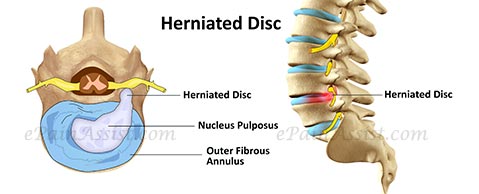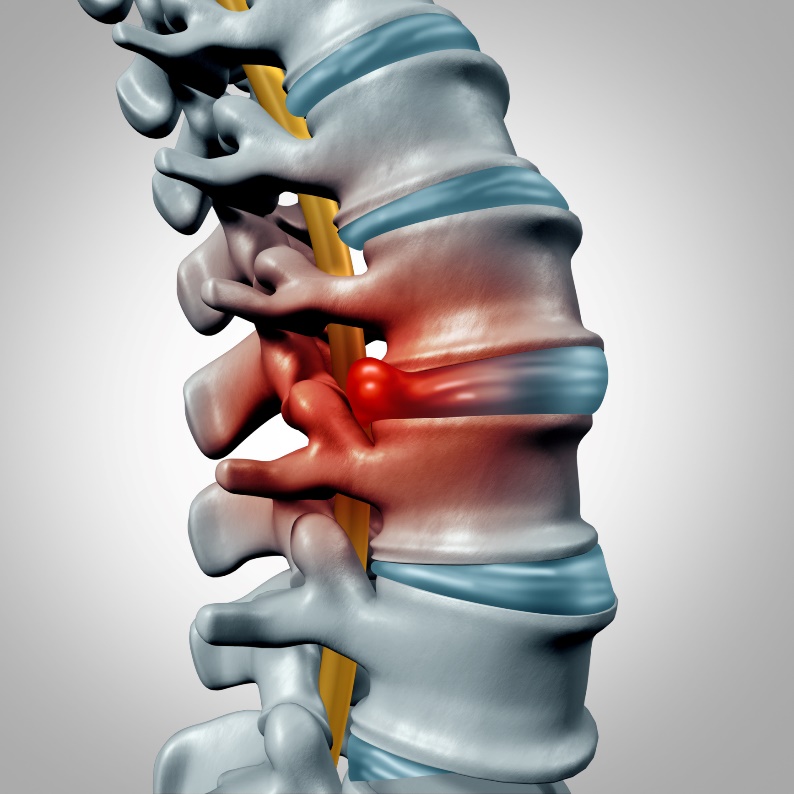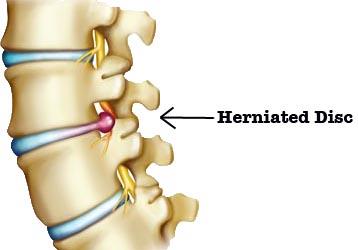Looking for a great Chiropractor to make you feel better?
Click on the link below to find the best Chiropractor near you
Find a Chiropractor Near Me
A herniated disc is a condition in which there is a problem with the cushions between the vertebrae that makes up the spine. The vertebrae are bones that join together to form the spine. A spinal disk is a little like a jelly donut, that has a softer center, with a tough exterior. There are situations in which the disk may rupture, or slip.
This usually occurs when the jelly pushes out through a tear in the tougher exterior. A herniated disk can cause a lot of discomforts. Some of these include irritations to the nerves, resulting in pain, numbness, and weakness in the arm or leg. There are also cases in which people do not present with any symptoms from a herniated disk. A lot of people that do have this condition usually don’t require surgery to fix the situation. This piece would focus on some ways to prevent and treat a herniated disc.
What Are The Symptoms Of Herniated Disk?
Most cases of a herniated disc usually affect the lower back. However, they can also affect other parts of the body such as the neck. Below are some of the common signs and symptoms of this condition:

- Pain in the extremities: In cases where the herniated disk affects the lower back, affected persons may feel intense pain in the buttocks, thighs, and calf. This may also involve some parts of the foot. On the other hand, in situations where the herniation is in the neck, patients may feel the pain in the shoulder and arm. The pain may also spread to the arm and legs, especially after coughing, or when you change into some certain positions.
- Numbness: Individuals affected with a herniated disk may feel some numbness in parts of the body supplied by the nerves.
- Weakness: Also, parts of the body supplied by the nerves may tend to weaken. This may cause the individual to fall, or develop an inability to lift items up.
- No symptoms: There are situations in which people develop a herniated disk without knowing. The images of herniated discs may show up accidentally, even in people who have shown no symptom.
Looking for a great Chiropractor to make you feel better?
Click on the link below to find the best Chiropractor near you
What Are The Causes Of Herniated Disk?
Disk herniation occurs as a result of progressive, aging-related wear and tear of the disks. Studies have shown that the spinal disks tend to lose their water content, as people age. This makes the disks rigid, and also prone to tearing or rupturing, even with a minor injury or twist. A lot of people affected with this condition are not able to point precisely to what has caused their herniated disk. Some of the common causes of this condition include using your back muscles instead of the leg and thigh muscles to lift heavy objects. There are rare conditions that cause the herniation of the disk. Some of these conditions include trauma, such as a fall or blow to the back.
When Is It Important To Go See A Doctor?
You should seek urgent medical attention if you notice that pain travels down your arm or leg, especially when it’s accompanied by numbness, tingling, and weakness of parts of the body.
What Are The Risk Factors Of Disk Herniation?
There are some factors that increase the risk of a herniated disk. Some of them include the following:
- Weight: Excess weight puts a lot of stress on the disks of the lower back.
- Genetics: Studies have shown that some individuals are more predisposed to developing disk herniation.
- Occupation: Individuals with jobs that are physically demanding tend to develop back problems. Jobs that have to do with pulling, pushing, bending sideways, and so on, increase the risk of developing a herniated chance.
What Are The Complications Of Disk Herniation?
There are some complications associated with disk herniation. The spinal cord doesn’t get to the lower portion of the spinal canal. However, it separates into a group of long nerve roots, just below the waist. On rare occasions, disk herniation can compress the long nerve roots. These nerve roots are known as cauda equine. There may be a need for emergency surgery if this is the case, to prevent permanent paralysis or weakness. You should immediately call for medical assistance if you notice any of the following:
- When the symptoms worsen: Persons affected may experience weakness or numbness to the point that they can’t carry out their daily activities.
- Persons affected with this condition may develop dysfunction of their bladder or bowel. People affected with equine cauda syndrome may become incontinent, or have difficulty passing urine, even with a full bladder.
- Saddle anesthesia: Patients may sometimes lose sensation that may be progressive, and would touch a saddle. This includes the inner thighs, back of legs, and the area around the rectum.
How To Prevent Herniated Disk?
Below are some of the things that can be done to prevent the development of disk herniation. They include the following:
- Exercise: Strengthening the muscles of the trunk, helps to stabilize and support the spine.
- Good posture: Maintaining a good posture, helps to reduce the pressure on the spine, and disks. You should endeavor to keep your back straight, especially when sitting for a long time.
- Keep a healthy weight: It’s important to maintain a healthy weight. As earlier mentioned, excess weight puts a lot of pressure on the spine and disks, which would make them prone to herniation.
How Is Herniated Disk Treated?
Most of the problems that arise from herniated disk usually improve on their own, within a few weeks. However, below are some of the ways the condition can be improved and treated:
- Rest: One of the best things to do in the case of herniated disk is to take some few days off. Rest have proven to be effective in improving the symptoms of the condition. Rest helps to improve swelling.
- Medications: Medications such as pain relievers, like ibuprofen, naproxen helps to relieve pain and reduces swelling.
- Physical therapy: There are some specific exercises that help to improve this condition. Some of them include massage, ultrasound therapy, ice and heat, aerobic exercises, and so on.
References
Is the Back Pain Field Hindering Progress In the Treatment of Chronic Back Pain?. (2010). The Back Letter, 25(9), 99. doi: 10.1097/01.back.0000388392.38274.4f
Thompson, E. (1996). Myofascial pain: asthma or the back and back pain in the workplace. Pain, 65(1), 111. doi: 10.1016/0304-3959(95)00223-5
Looking for a great Chiropractor to make you feel better?
Click on the link below to find the best Chiropractor near you




